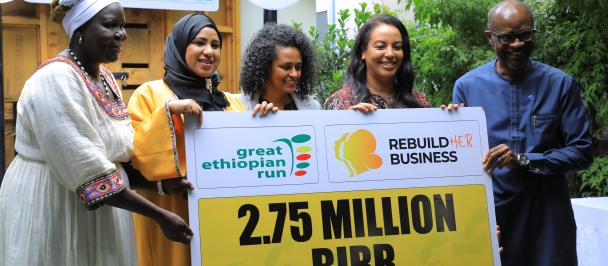UNDP Ethiopia celebrated International Women Day (IWD) in partnership with Ministry of Women and Youth through an event that engaged young girls and women.
This year’s IWD is celebrated with the theme of ‘I am Generation Equality: Realizing Women’s Rights’ to advance gender equality worldwide. Ethiopia is celebrating IWD for the 44th time and coined its own theme to reflect its current context, ‘Ensuring women’s security and rights, is the foundation for our peace and existence’.
Building on the latest Human Development Report, UNDP launched the Gender Social Norm Index and #CheckYourBias initiative on 5th March 2020, capturing how social beliefs can obstruct gender equality along multiple dimensions: politics, economics, education and physical integrity.
Shocking results from this study reveals that global progress towards gender equality is, in fact, slowing. At present, only 14 per cent of women and 10 per cent of men worldwide have no gender social norm bias.
Addressing this issue on his statement on the International Women Day, UNDP’s Administrator, Achim Steiner, stressed, “As we enter the Decade of Action for the Sustainable Development Goals, we must shatter longstanding biases and prejudices if we are to achieve gender equality,”
Speaking at the IWD celebrations in Ethiopia, Minister Yalem Tsegaye, Ministry of Women and Youth emphasized, “We should use such celebrations to set common agendas to find solutions for issues we are facing as a country such as the prevention of violence against women.”
The event was showcased the talent of children who presented role plays and songs that depict the historical role of women in politics, power and decision making.
Experts from the Federal Attorney General, Federal Supreme Court, the Ethiopian Human Rights Commission, the Police Commission and the Ministry of Women and Youth discussed the role of women in peace-building and conflict resolution; impact of instability on women and girls and addressing violence against women.
Dr. Rahwa Mussie, State Minister, Ministry of Peace, touched on how social biases and normalization of violence perpetuates gender based violence in the country. “Women shouldn’t always be seen as victims but rather as contributors of peace, politics, social and economic affairs of the country,” she said.
In Ethiopia, specifically in the capital Addis Ababa, progresses was said to have been made in areas of access to treatment and counselling for women and girls affected by violence while lack of adequate rehabilitation centres continue to be a challenge in the city and country as a whole.
The event recognized organizations supporting women and girls affected by violence and in-kind contributions were made to selected facilities. The event was supported by UNDP's Women in Peace Project and it was held at the premises of Cheshire Foundation, a non-profit organization providing physical rehabilitation for persons with disability .
Implemented in Oromia and Somali regions, UNDP's Women in Peace Project adopts Gender Based Approach to Peace Building and Conflict Resolution to address recurring and emerging conflicts. It supports women to assume a centre stage in efforts to resolve conflicts as they are not only affected by conflicts but also bear responsibility for the larger part of the society during conflicts.
H.E Yalem Tsegaye, Minister for Ministry of Women and Youth

 Locations
Locations

